高考英语写作-句子成分分析教学课件(34张PPT)
文档属性
| 名称 | 高考英语写作-句子成分分析教学课件(34张PPT) |
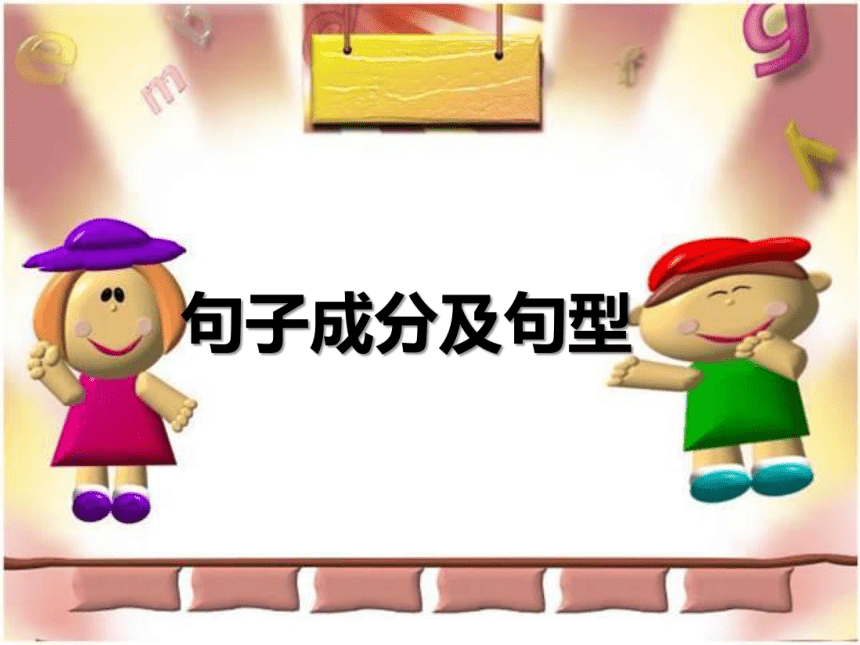
|
|
| 格式 | zip | ||
| 文件大小 | 933.0KB | ||
| 资源类型 | 试卷 | ||
| 版本资源 | 通用版 | ||
| 科目 | 英语 | ||
| 更新时间 | 2021-09-09 00:00:00 | ||
图片预览

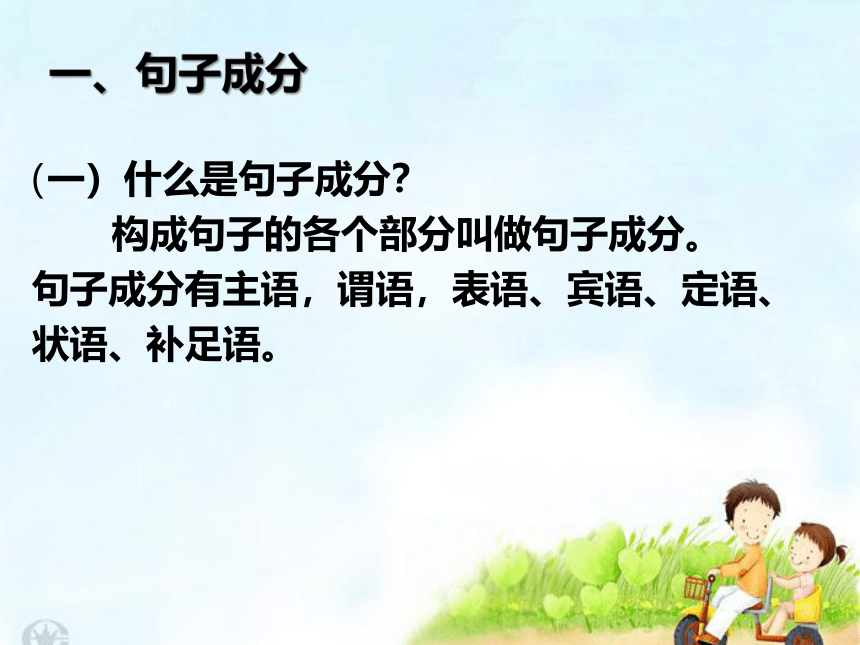
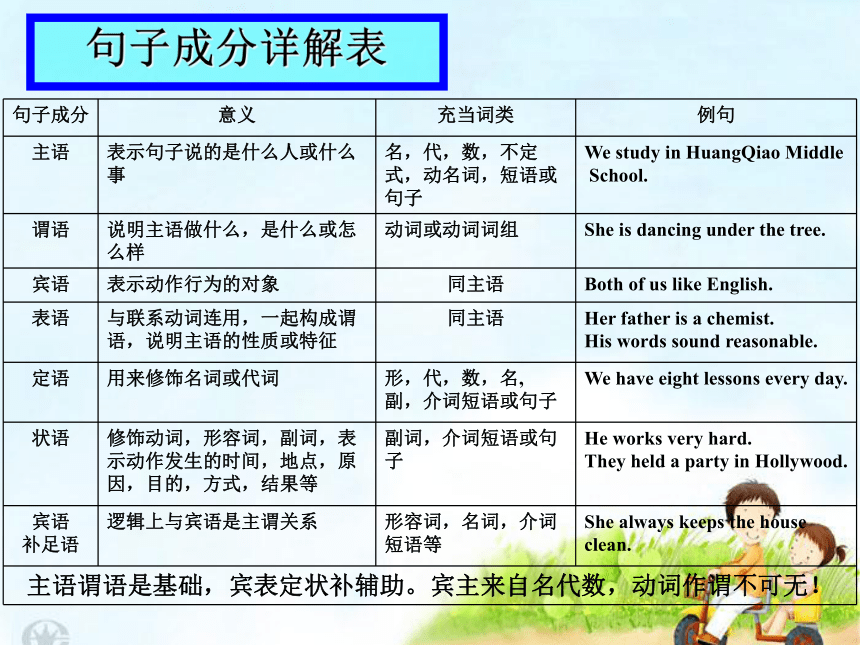
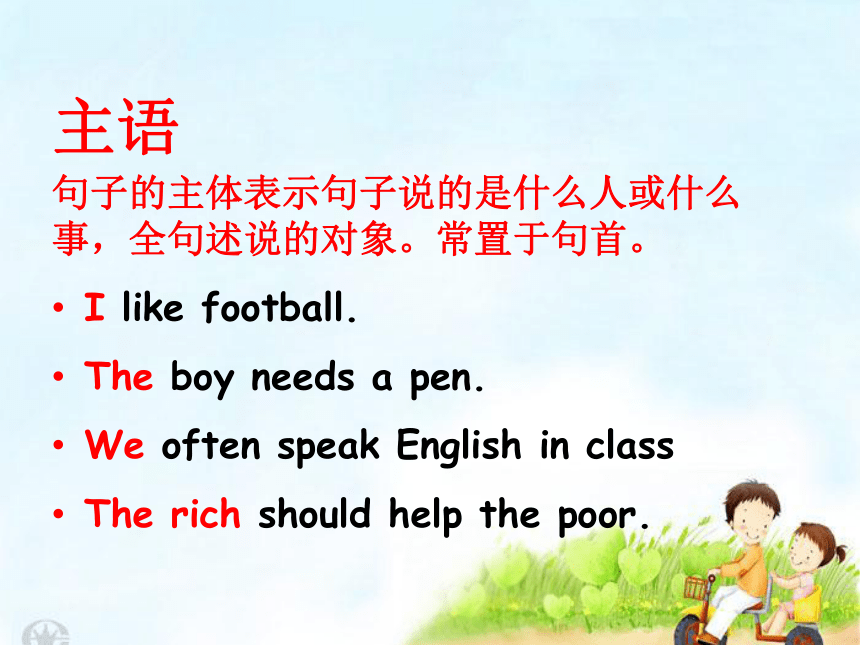
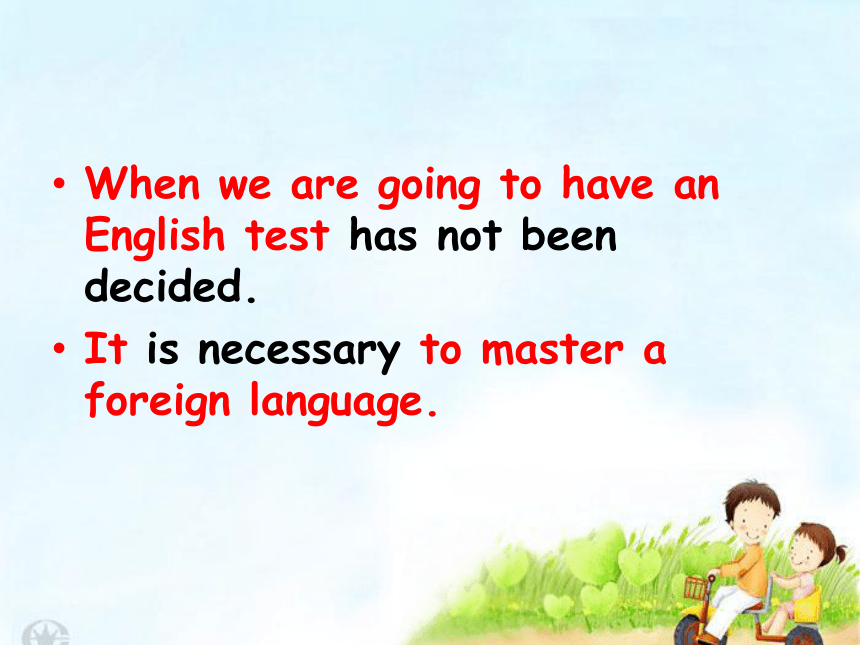
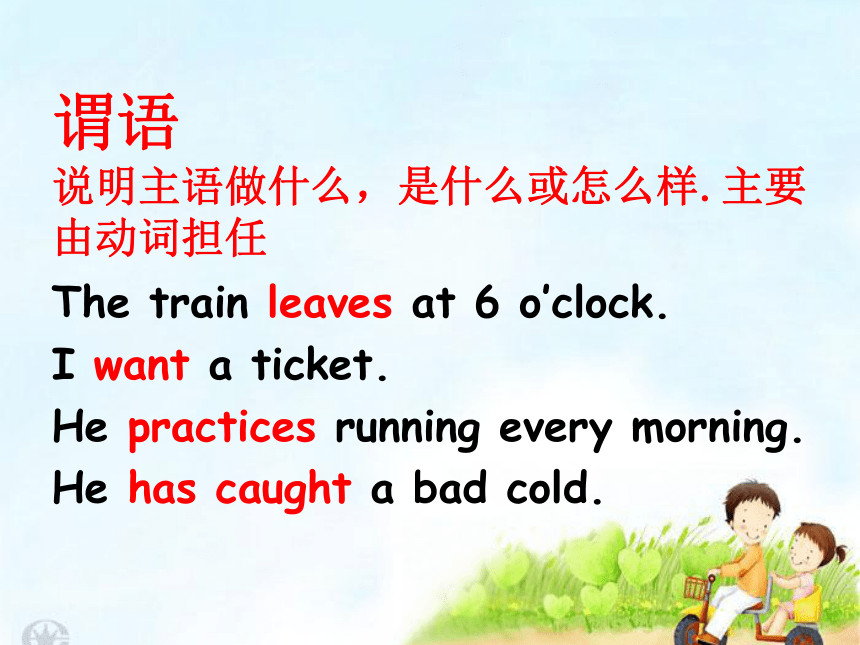
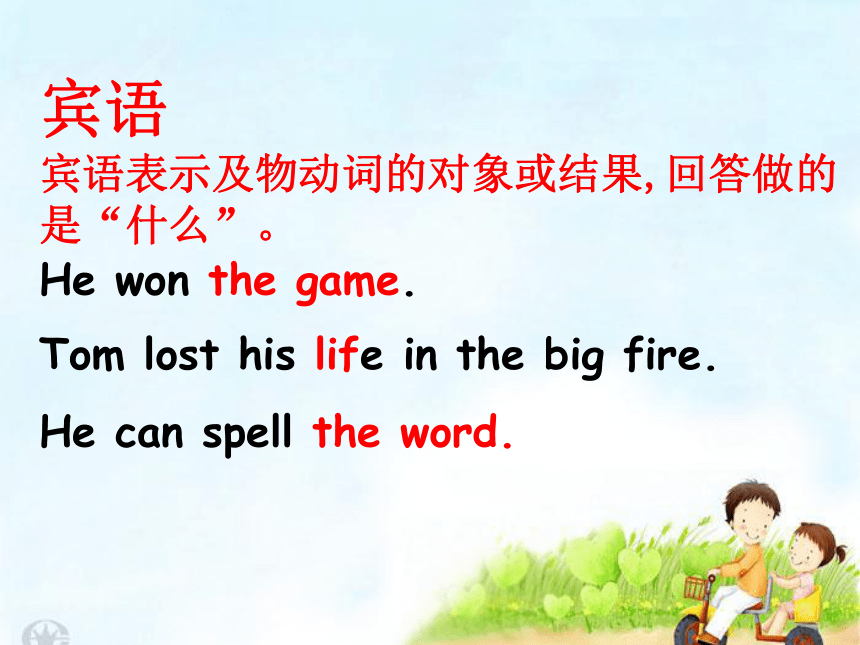
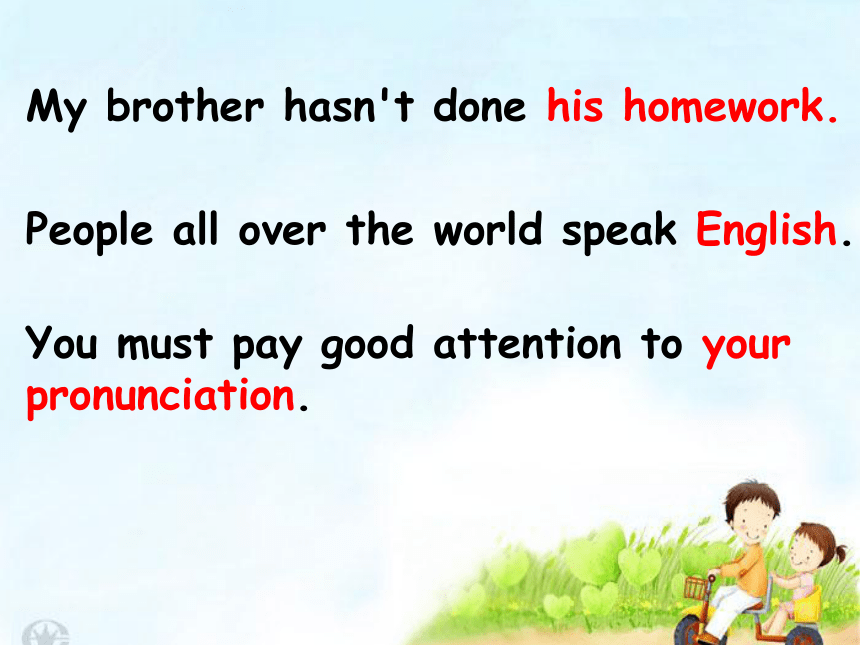
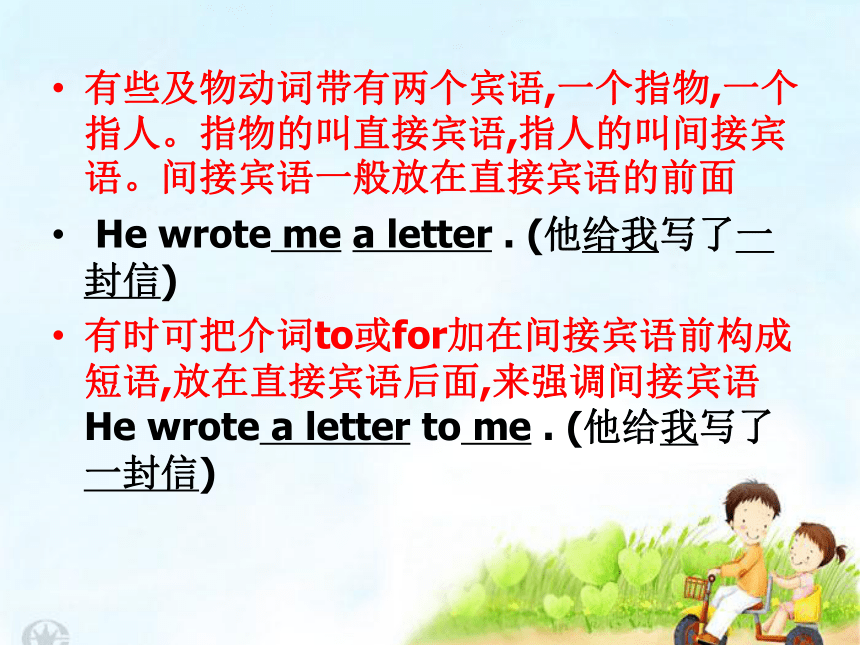
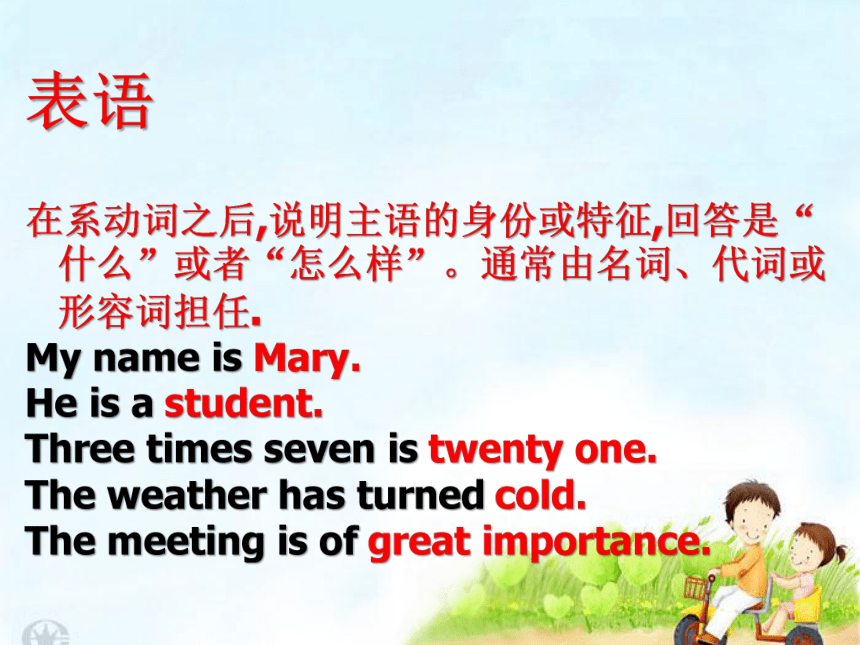
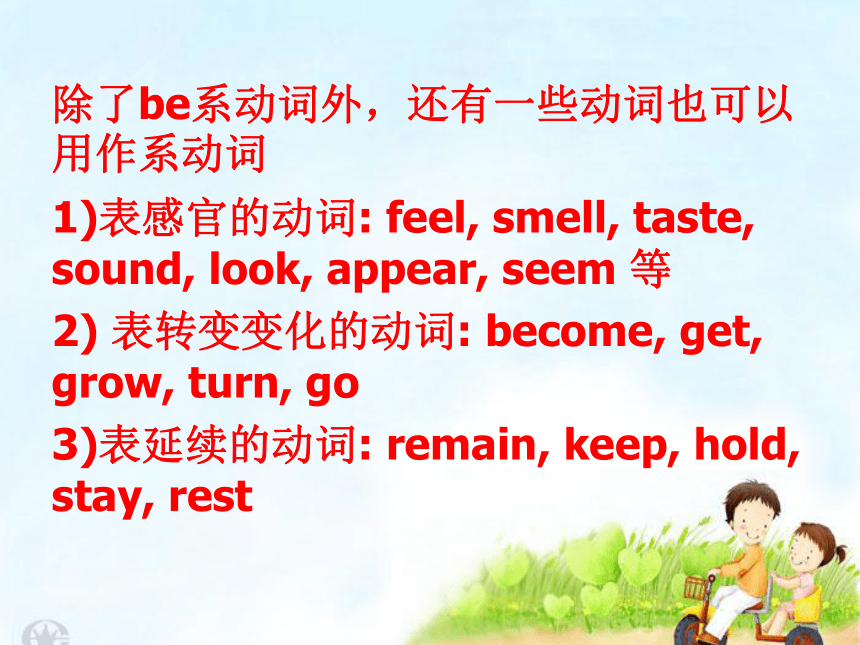
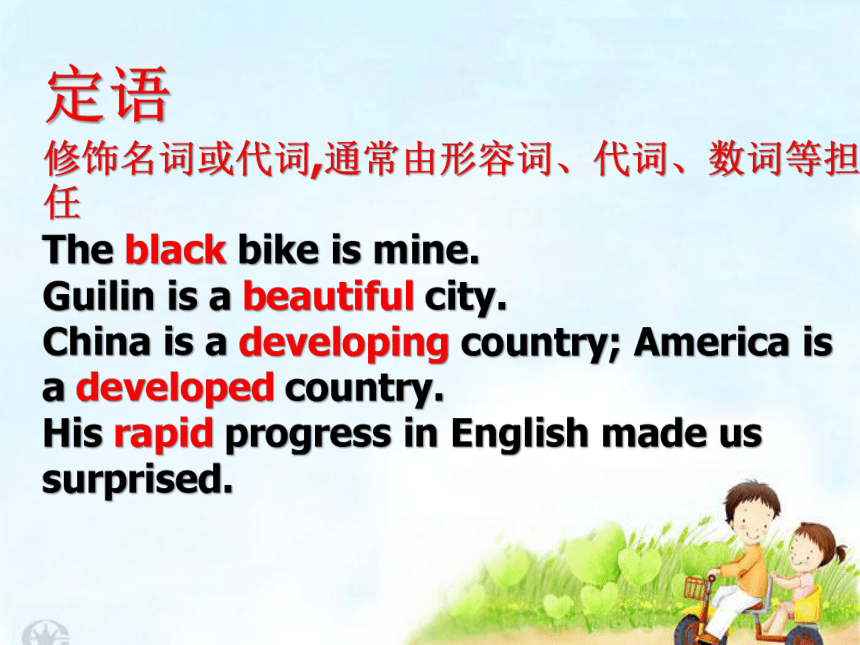
文档简介
(共34张PPT)
句子成分及句型
一、句子成分
(一)什么是句子成分?
构成句子的各个部分叫做句子成分。
句子成分有主语,谓语,表语、宾语、定语、
状语、补足语。
句子成分详解表
句子成分
意义
充当词类
例句
主语
表示句子说的是什么人或什么
事
名,代,数,不定
式,动名词,短语或
句子
We
study
in
HuangQiao
Middle
School.
谓语
说明主语做什么,是什么或怎
么样
动词或动词词组
She
is
dancing
under
the
tree.
宾语
表示动作行为的对象
同主语
Both
of
us
like
English.
表语
与联系动词连用,一起构成谓
语,说明主语的性质或特征
同主语
Her
father
is
a
chemist.
His
words
sound
reasonable.
定语
用来修饰名词或代词
形,代,数,名,
副,介词短语或句子
We
have
eight
lessons
every
day.
状语
修饰动词,形容词,副词,表
示动作发生的时间,地点,原
因,目的,方式,结果等
副词,介词短语或句
子
He
works
very
hard.
They
held
a
party
in
Hollywood.
宾语
补足语
逻辑上与宾语是主谓关系
形容词,名词,介词
短语等
She
always
keeps
the
house
clean.
主语谓语是基础,宾表定状补辅助。宾主来自名代数,动词作谓不可无!
主语
句子的主体表示句子说的是什么人或什么
事,全句述说的对象。常置于句首。
I
like
football.
The
boy
needs
a
pen.
We
often
speak
English
in
class
The
rich
should
help
the
poor.
When
we
are
going
to
have
an
English
test
has
not
been
decided.
It
is
necessary
to
master
a
foreign
language.
谓语
说明主语做什么,是什么或怎么样.主要
由动词担任
The
train
leaves
at
6
o’clock.
I
want
a
ticket.
He
practices
running
every
morning.
He
has
caught
a
bad
cold.
宾语
宾语表示及物动词的对象或结果,回答做的是“什么”。
He
won
the
game.
Tom
lost
his
life
in
the
big
fire.
He
can
spell
the
word.
My
brother
hasn't
done
his
homework.
People
all
over
the
world
speak
English.
You
must
pay
good
attention
to
your
pronunciation.
有些及物动词带有两个宾语,一个指物,一个指人。指物的叫直接宾语,指人的叫间接宾语。间接宾语一般放在直接宾语的前面
He
wrote
me
a
letter
.
(他给我写了一封信)
有时可把介词to或for加在间接宾语前构成短语,放在直接宾语后面,来强调间接宾语He
wrote
a
letter
to
me
.
(他给我写了一封信)
表语
在系动词之后,说明主语的身份或特征,回答是“什么”或者“怎么样”。通常由名词、代词或形容词担任.
My
name
is
Mary.
He
is
a
student.
Three
times
seven
is
twenty
one.
The
weather
has
turned
cold.
The
meeting
is
of
great
importance.
除了be系动词外,还有一些动词也可以用作系动词
1)表感官的动词:
feel,
smell,
taste,
sound,
look,
appear,
seem
等
2)
表转变变化的动词:
become,
get,
grow,
turn,
go
3)表延续的动词:
remain,
keep,
hold,
stay,
rest
定语
修饰名词或代词,通常由形容词、代词、数词等担任
The
black
bike
is
mine.
Guilin
is
a
beautiful
city.
China
is
a
developing
country;
America
is
a
developed
country.
His
rapid
progress
in
English
made
us
surprised.
状语
用来修饰动词、形容词、副词或整句
修饰动词,通常位于动词后
He
works
hard.
修饰形容词或副词时,位于被修饰的词之前;
I
am
very
sorry.
表示时间、地点、目的的状语一般位于句子两头,强调时放在句首
When
I
grow
up
,
I
am
going
to
be
a
teacher.
一些表示不确定时间(如:often)或程度(如:almost)的副词状语通常位于be动词、助动词、情态动词之后,动词之前
We
often
help
him.
宾语补足语
用来说明宾语怎么样或干什么
I
consider
the
book
too
expensive.
They
painted
their
boat
white.
We
found
everything
in
the
lab
in
good
order.
英语句型
简单句
并列句
复合句
简单句
主系表结构
主语+系动词+表语.主要用以说明主语的特征,类属,状态,身份等。
You
are
students.
We
are
in
the
classroom.
We
are
good
friends
系动词有:
1.表示特征和存在状态的
be,
seem,
feel,
appear,
look,
smell,
taste,
sound;
2.表示状态延续的
remain,
stay,
keep,
continue,
stand;
3.表示状态变化的
become,
get,
turn,
go,
run,
fall,
come,
grow;
Trees
are
green.
Our
English
teacher
is
thirty
years
old.
The
potatoes
went
bad
in
the
fields.
Her
job
is
to
look
after
the
children
in
the
nursery.
主谓结构
主语+不及物的动词
You
will
graduate
next
year.
The
car
accident
happened
yesterday.
主谓宾结构
主语+及物动词+宾语
I
like
my
job
very
much.
He
grew
some
vegetables.
I
have
a
dream.
I
like
basketball.
主谓双宾
主语+及物动词+间接宾语+直接宾语
He
gave
his
sister
the
piano.
He
gave
the
piano
to
his
sister.
常跟双宾语的动词
bring,
give,
lend,
hand,
offer,
pass,
send,
show,
teach,
tell,
write,
ask,
buy
主谓宾宾补
主语+及物动词+宾语+宾补
We
saw
them
dancing.
You
kept
me
waiting
for
a
year.
Last
week
I
went
to
the
supermarket.
Last
week
I
went
to
the
supermarket.
状
主
谓
状
The
play
was
very
interesting.
The
play
was
very
interesting.
主
系
状 表
I
can’t
hear
a
word.
I
can’t
hear
a
word.
主 谓
宾
They
were
talking
loudly.
They
were
talking
loudly.
主
谓
状
并列句
简单句+并列连词+简单句
相互之间没有从属关系,是平行并列的关系
You
help
him
and
he
helps
you.
1、表示连接两个同等概念,常用and,
not
only…but
also…,
neither…nor…,
then等连接。
e.g.
The
teacher’s
name
is
Smith,
and
the
student’s
name
is
John.
2、表示选择,常用的连词有or,
either…or…,
otherwise等。
e.g.
Hurry
up,
or
you’ll
miss
the
train.
2、表示选择,常用的连词有or,
either…or…,
otherwise等。
e.g.
Hurry
up,
or
you’ll
miss
the
train.
3、表示转折,常用的连词有but,
yet,
while等。
e.g.
He
was
a
little
man
with
thick
glasses,
but
he
had
a
strange
way
of
making
his
classes
lively
and
interesting.
He
asked
his
father
why
he
couldn’t
hatch
chickens
while
hens
could.
Although
the
matter
sounds
strange,
yet
it
is
really
true.
4、表示因果关系,常用的连词有so,
for等。
e.g.
August
is
the
time
of
the
year
for
rice
harvest,
so
every
day
I
work
from
dawn
until
dark.
He
shook
his
head,
for
he
thought
differently.
Unlike
watching
TV,
reading
is
a
highly
active
process___
it
requires
attention
as
well
as
money
and
imagination.
until
B.
but
C.
unless
D.
for
She
is
American,
____
she
knows
little
about
American
history.
A.
so
B.
yet
C.
and
D.
therefore
复合句
主句+连词+从句;或连词+从句+主句
含有一个或一个以上从句,含有两个或两个以上主谓结构
The
foreign
visitors
took
a
lot
of
pictures
when
they
were
at
the
Great
Wall.
He
was
fond
of
drawing
when
he
was
yet
a
child
练习:简单句、并列句和复合句
判断下列句子是简单句,并列句还是复合句:
1.
We
often
study
Chinese
history
on
Friday
afternoon.
2.
The
boy
who
offered
me
his
seat
is
called
Tom.
3.
There
is
a
chair
in
this
room,
isn’t
there?
4.
My
brother
and
I
go
to
school
at
half
past
seven
in
the
morning
and
come
back
home
at
seven
in
the
evening.
简单句
复合句
简单句
简单句
Thank
you!
句子成分及句型
一、句子成分
(一)什么是句子成分?
构成句子的各个部分叫做句子成分。
句子成分有主语,谓语,表语、宾语、定语、
状语、补足语。
句子成分详解表
句子成分
意义
充当词类
例句
主语
表示句子说的是什么人或什么
事
名,代,数,不定
式,动名词,短语或
句子
We
study
in
HuangQiao
Middle
School.
谓语
说明主语做什么,是什么或怎
么样
动词或动词词组
She
is
dancing
under
the
tree.
宾语
表示动作行为的对象
同主语
Both
of
us
like
English.
表语
与联系动词连用,一起构成谓
语,说明主语的性质或特征
同主语
Her
father
is
a
chemist.
His
words
sound
reasonable.
定语
用来修饰名词或代词
形,代,数,名,
副,介词短语或句子
We
have
eight
lessons
every
day.
状语
修饰动词,形容词,副词,表
示动作发生的时间,地点,原
因,目的,方式,结果等
副词,介词短语或句
子
He
works
very
hard.
They
held
a
party
in
Hollywood.
宾语
补足语
逻辑上与宾语是主谓关系
形容词,名词,介词
短语等
She
always
keeps
the
house
clean.
主语谓语是基础,宾表定状补辅助。宾主来自名代数,动词作谓不可无!
主语
句子的主体表示句子说的是什么人或什么
事,全句述说的对象。常置于句首。
I
like
football.
The
boy
needs
a
pen.
We
often
speak
English
in
class
The
rich
should
help
the
poor.
When
we
are
going
to
have
an
English
test
has
not
been
decided.
It
is
necessary
to
master
a
foreign
language.
谓语
说明主语做什么,是什么或怎么样.主要
由动词担任
The
train
leaves
at
6
o’clock.
I
want
a
ticket.
He
practices
running
every
morning.
He
has
caught
a
bad
cold.
宾语
宾语表示及物动词的对象或结果,回答做的是“什么”。
He
won
the
game.
Tom
lost
his
life
in
the
big
fire.
He
can
spell
the
word.
My
brother
hasn't
done
his
homework.
People
all
over
the
world
speak
English.
You
must
pay
good
attention
to
your
pronunciation.
有些及物动词带有两个宾语,一个指物,一个指人。指物的叫直接宾语,指人的叫间接宾语。间接宾语一般放在直接宾语的前面
He
wrote
me
a
letter
.
(他给我写了一封信)
有时可把介词to或for加在间接宾语前构成短语,放在直接宾语后面,来强调间接宾语He
wrote
a
letter
to
me
.
(他给我写了一封信)
表语
在系动词之后,说明主语的身份或特征,回答是“什么”或者“怎么样”。通常由名词、代词或形容词担任.
My
name
is
Mary.
He
is
a
student.
Three
times
seven
is
twenty
one.
The
weather
has
turned
cold.
The
meeting
is
of
great
importance.
除了be系动词外,还有一些动词也可以用作系动词
1)表感官的动词:
feel,
smell,
taste,
sound,
look,
appear,
seem
等
2)
表转变变化的动词:
become,
get,
grow,
turn,
go
3)表延续的动词:
remain,
keep,
hold,
stay,
rest
定语
修饰名词或代词,通常由形容词、代词、数词等担任
The
black
bike
is
mine.
Guilin
is
a
beautiful
city.
China
is
a
developing
country;
America
is
a
developed
country.
His
rapid
progress
in
English
made
us
surprised.
状语
用来修饰动词、形容词、副词或整句
修饰动词,通常位于动词后
He
works
hard.
修饰形容词或副词时,位于被修饰的词之前;
I
am
very
sorry.
表示时间、地点、目的的状语一般位于句子两头,强调时放在句首
When
I
grow
up
,
I
am
going
to
be
a
teacher.
一些表示不确定时间(如:often)或程度(如:almost)的副词状语通常位于be动词、助动词、情态动词之后,动词之前
We
often
help
him.
宾语补足语
用来说明宾语怎么样或干什么
I
consider
the
book
too
expensive.
They
painted
their
boat
white.
We
found
everything
in
the
lab
in
good
order.
英语句型
简单句
并列句
复合句
简单句
主系表结构
主语+系动词+表语.主要用以说明主语的特征,类属,状态,身份等。
You
are
students.
We
are
in
the
classroom.
We
are
good
friends
系动词有:
1.表示特征和存在状态的
be,
seem,
feel,
appear,
look,
smell,
taste,
sound;
2.表示状态延续的
remain,
stay,
keep,
continue,
stand;
3.表示状态变化的
become,
get,
turn,
go,
run,
fall,
come,
grow;
Trees
are
green.
Our
English
teacher
is
thirty
years
old.
The
potatoes
went
bad
in
the
fields.
Her
job
is
to
look
after
the
children
in
the
nursery.
主谓结构
主语+不及物的动词
You
will
graduate
next
year.
The
car
accident
happened
yesterday.
主谓宾结构
主语+及物动词+宾语
I
like
my
job
very
much.
He
grew
some
vegetables.
I
have
a
dream.
I
like
basketball.
主谓双宾
主语+及物动词+间接宾语+直接宾语
He
gave
his
sister
the
piano.
He
gave
the
piano
to
his
sister.
常跟双宾语的动词
bring,
give,
lend,
hand,
offer,
pass,
send,
show,
teach,
tell,
write,
ask,
buy
主谓宾宾补
主语+及物动词+宾语+宾补
We
saw
them
dancing.
You
kept
me
waiting
for
a
year.
Last
week
I
went
to
the
supermarket.
Last
week
I
went
to
the
supermarket.
状
主
谓
状
The
play
was
very
interesting.
The
play
was
very
interesting.
主
系
状 表
I
can’t
hear
a
word.
I
can’t
hear
a
word.
主 谓
宾
They
were
talking
loudly.
They
were
talking
loudly.
主
谓
状
并列句
简单句+并列连词+简单句
相互之间没有从属关系,是平行并列的关系
You
help
him
and
he
helps
you.
1、表示连接两个同等概念,常用and,
not
only…but
also…,
neither…nor…,
then等连接。
e.g.
The
teacher’s
name
is
Smith,
and
the
student’s
name
is
John.
2、表示选择,常用的连词有or,
either…or…,
otherwise等。
e.g.
Hurry
up,
or
you’ll
miss
the
train.
2、表示选择,常用的连词有or,
either…or…,
otherwise等。
e.g.
Hurry
up,
or
you’ll
miss
the
train.
3、表示转折,常用的连词有but,
yet,
while等。
e.g.
He
was
a
little
man
with
thick
glasses,
but
he
had
a
strange
way
of
making
his
classes
lively
and
interesting.
He
asked
his
father
why
he
couldn’t
hatch
chickens
while
hens
could.
Although
the
matter
sounds
strange,
yet
it
is
really
true.
4、表示因果关系,常用的连词有so,
for等。
e.g.
August
is
the
time
of
the
year
for
rice
harvest,
so
every
day
I
work
from
dawn
until
dark.
He
shook
his
head,
for
he
thought
differently.
Unlike
watching
TV,
reading
is
a
highly
active
process___
it
requires
attention
as
well
as
money
and
imagination.
until
B.
but
C.
unless
D.
for
She
is
American,
____
she
knows
little
about
American
history.
A.
so
B.
yet
C.
and
D.
therefore
复合句
主句+连词+从句;或连词+从句+主句
含有一个或一个以上从句,含有两个或两个以上主谓结构
The
foreign
visitors
took
a
lot
of
pictures
when
they
were
at
the
Great
Wall.
He
was
fond
of
drawing
when
he
was
yet
a
child
练习:简单句、并列句和复合句
判断下列句子是简单句,并列句还是复合句:
1.
We
often
study
Chinese
history
on
Friday
afternoon.
2.
The
boy
who
offered
me
his
seat
is
called
Tom.
3.
There
is
a
chair
in
this
room,
isn’t
there?
4.
My
brother
and
I
go
to
school
at
half
past
seven
in
the
morning
and
come
back
home
at
seven
in
the
evening.
简单句
复合句
简单句
简单句
Thank
you!
同课章节目录
